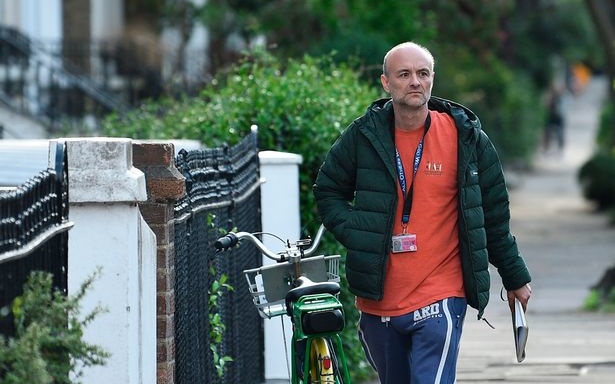Dominic Cummings, chief advisor to UK Prime Minister Boris Johnson, heckled by neighbors after he broke Government rules on Coronavirus, London, May 24, 2020
Author’s Note: After writing the draft, I learned of the killing of George Floyd by a police officer in Minnesota. I am now trying to deal with my outrage.
We are now living in an era of outrage. It is not good for our health, soul, and spirit.
Outrage with the revelation that an investigation by Durham police concluded that Dominic Cummings, chief adviser to UK Prime Minister Boris Johnson, breached Coronavirus lockdown rules with a 60-mile holiday trip on his wife’s birthday, while I can’t go and see my grandmother who lives four miles down the road. Outrage when the BBC decide to report on a story about a small group of British Muslims observing social distancing measures whilst performing Eid Prayers, yet the mass conga dance on V-E Day is unnoticed. Outraged by wearing a mask or not wearing a mask.
Outraged with every headline. Outraged by every comment on social media. In Portsmouth, the headline is “Outrage as Teenage Gathering on Southsea Common During Coronavirus Lockdown ‘Puts Lives at Risk'”. The Birmingham Mail sees “Outrage at Group of Youths Flouting Social Distancing at Warley Woods”.
See also EA on talkRADIO: UK and Coronavirus — An Illegal Act, An Irresponsible Government
On Bank Holiday Monday, I put away my phone, I did not read, follow, or observe the news. I was not outraged by the performance of Cummings during his press conference. It was the best six hours I have had for a long time, as I enjoyed my socially-distanced BBQ burger.
Of course I understand why people are outraged by Cummings, revellers at a beach, or the public displays of affection in a park. Many people have made sacrifices. Many are still following the guidelines of “stay at home”, or now “staying alert”.
But the condition of being outraged doesn’t help with our mental health in this situation. It creates more barriers between people as we put them into boxes with labels of “stupid”, “insensitive”, “reckless”, “Trumpian”, “ignorant”. In a polarized world of “right” v. “left” and “Brexiter” v. “Remainer”, this is just another layer of conflict with no chance of common ground. Outrage doesn’t make us smart. A chip on the shoulder doesn’t make us happy.
Outrage only compounds the difficulty of being in a confined space with a partner and children doesn’t help. And for those with no partner or children, outrage can only increase the risk of depression and anxiety.
Yet there remains so much to provoke our anger. Almost 40,000 officially-recorded deaths from Coronavirus in the UK, with many more unrecorded. Tens of thousands perishing in care homes. Shortage of personal protective equipment for UK carers and medical staff, hundreds of whom have died. Lack of testing. Lack of funding for the National Health Service.
How to limit the outrage? Cutting ourselves completely is not an option, unless we give up caring about those who are suffering — often unnecessarily — in this crisis.
Perhaps we can control how we deal with the circumstances. Next time you read, hear, or watch, and the outrage switch comes on, ask yourselves the following question:
Does your outrage change the behavior of others?
Does it change laws and policies?
Does it accomplish anything positive?
Will this solve the problem or will this only upset me further?
Outrage isn’t the solution, but the problem. Change will come when emotion is replaced by a rational, caring approach. Pick your battles to choose that path.


Sure outrage can be detrimental to personal mental health – however I’d propose a counterpoint that it’s detrimental only when it’s neutered. ‘Screaming into the void’ does not achieve results but the righteous protest and fury being seen in the USA right now and indeed directed towards Mr Cummings is a healthy part of democracy – it can and will achieve results. The French Revolution, Civil Rights Movement in USA, Stonewall Riots, Arab Spring, Women’s Suffrage, Monday Demonstrations, Take Back the Night…..the list goes on, all born of outrage.
While on an individual level some may feel this ‘isn’t for them’ – history shows us that outrage, which can (although not always) lead to violent protest, does indeed create change. Don’t deny your true emotions, that way madness lies.
Thanks for the thought provoking article!
TS,
Thanks very much for this thoughtful comment.
S.